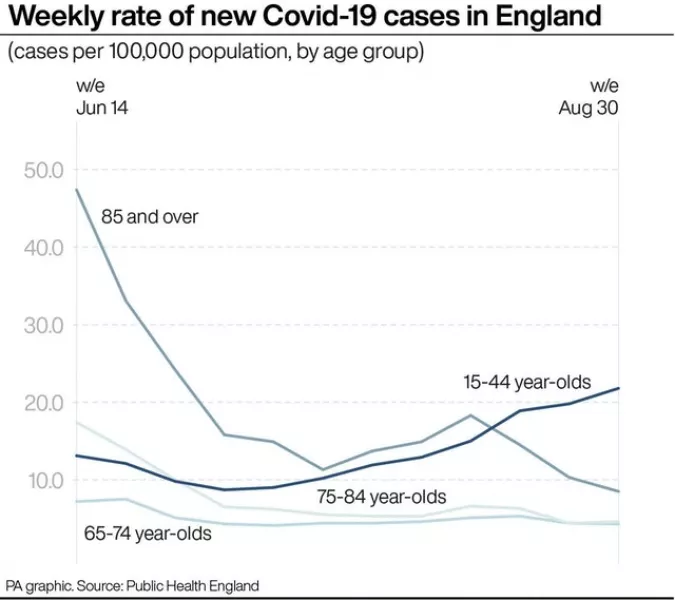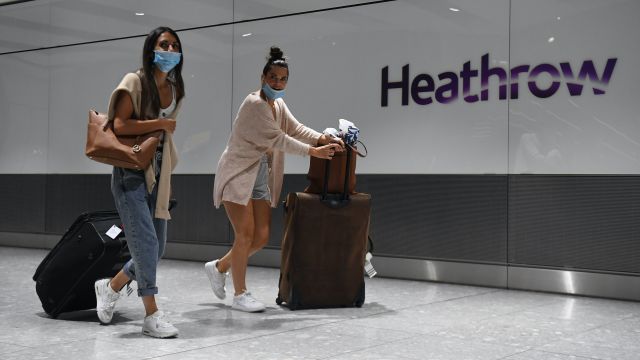From 4am on Wednesday, arrivals from seven Greek islands will need to self-isolate for 14 days, but mainland Greece will maintain its coronavirus quarantine-exemption.
The decision brings England partly into line with Wales, which removed six Greek islands from its quarantine-free list last week.
Mr Shapps said: “Our top priority has always been to keep domestic infection rates down, and today we’re taking the next step in our approach.
“Through the use of enhanced data we will now be able to pinpoint risk in some of the most popular islands, providing increased flexibility to add or remove them – distinct from the mainland – as infection rates change.
“This development will help boost the UK’s travel industry while continuing to maintain maximum protection to public health, keeping the travelling public safe.”
The Department for Transport (DfT) said the Greek islands of Lesvos, Tinos, Serifos, Mykonos, Crete, Santorini and Zakynthos (also known as Zante) are losing their quarantine-exemptions, because data from the Joint Biosecurity Centre and Public Health England “has indicated a significant risk to UK public health from those islands”.
The Welsh Government has also removed the quarantine-free status of Paros and Antiparos, but not Tinos, Serifos or Santorini.

The UK Government’s regional policy will only apply to land that has a “clear boundary” – such as an island – and “internationally comparable data” on coronavirus cases, the DfT added.
In a statement to the Commons, Mr Shapps told MPs that no islands will immediately be added to England’s list.
He said: “When we removed Spain from the travel corridor list there were 24 cases per 100,000. Today there are 127 cases and it remains too high in the Balearic and Canary Islands as well.”
The Cabinet minister went on to say that his department is “working actively on the practicalities of using testing to release people from quarantine earlier than 14 days”.
An option involving only a test-on-arrival “would not work”, he added.
Confederation of British Industry policy director Matthew Fell said the move to a more regional approach is a “positive step” but warned the “blunt instrument” of quarantining is damaging trade and tourism.
“Industry and government must continue to work together on vital next steps, such as the introduction of testing at airports as a genuine alternative to lengthy quarantine periods,” he added.
Mr Shapps’ comments in relation to international travel were broadly welcomed by the travel industry.
A spokeswoman for travel trade organisation Abta said: “Today’s announcement regarding travel from specific islands to England is welcome and the industry hopes that this will in turn lead to a more targeted approach such as that adopted in Germany and the Netherlands, which would also reflect the UK’s domestic strategy of localised lockdowns.
“It also however highlights the requirement for a more coordinated approach from the home nations to prevent avoidable confusion.”

Paul Charles, chief executive of travel consultancy The PC Agency, said: “Regional corridors are vital to keep travel and tourism alive and well, and I hope it removes the confusion of different UK governments pursuing different approaches to individual countries.
“It’s sad news for the Greek islands who can’t yet open up, but I hope this policy provides impetus for them to get their cases under control.”
A spokesman for British Airways’ owner IAG said: “It was evident back in July that islands should be treated separately. The Government is being too slow in making obvious decisions.
“For most families summer is now over and the damage to the industry and the economy is done. On testing, we need to get on with it. We are way behind other countries on what has to be a more nuanced approach.”







